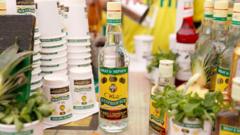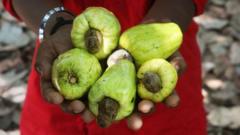The debate centers on amendments made to Jamaica's geographical indication laws regarding rum, sparking controversy between producers who oppose aging the spirit overseas and those whose business models rely on it.
The Legal Battle Over What Defines Jamaican Rum

The Legal Battle Over What Defines Jamaican Rum
A heated dispute unfolds in Jamaica over the legal definition of its rum, with significant implications for local distilleries and the island's cultural identity.
Empty Line 4
Rum is an essential part of Jamaica's cultural heritage, yet the question of what legitimately qualifies as "Jamaican rum" has sparked controversy on the island. This ongoing legal dispute has emerged following amendments to the geographical indication (GI) designation for Jamaican Rum, which were adjusted by the Intellectual Property Office of Jamaica (JIPO) in October 2022. A major change prohibits the aging of Jamaican rum outside of the island, a move backed by the Spirits Pool Association (SPA) representing six distilleries, including Appleton Estate and Hampden Estate.
The SPA argues that a stricter GI is necessary for authenticity, protecting Jamaican rum in crucial markets like the EU and US. They claim that this measure would enhance the product's recognition as a premium offering while ensuring that the rum's production and aging occur locally, thus benefiting the Jamaican economy through value-added processes like bottling and refining.
However, National Rums of Jamaica (NRJ), one of the largest producers, is contesting the ruling, asserting that rum aged outside Jamaica should still carry the "Jamaica rum" label. With significant holdings in Clarendon and Long Pond and a business model dependent on exporting rum for aging, NRJ warns that the new rules could threaten their operation, citing historical precedence for aging rum internationally.
The debate underscores the complex relationship between geographical indications and product authenticity. Experts like Dev Gangjee, an intellectual property law professor at Oxford, note that GIs can grant products premium pricing, anchor production to specific areas, and promote tourism. These factors have fueled discussions not only in Jamaica but also in Barbados, where a similar dispute is ongoing over the establishment of a GI for rum.
With both parties at odds, the SPA hopes for a resolution that honors Jamaica's rich rum heritage while ensuring its economic viability. As the rum industry worldwide continues to evolve, the outcome of this legal battle could set a pivotal precedent for the role of geographical designations in alcohol production. The path forward remains uncertain as stakeholders await the upcoming hearing set for April 28, which could define the future of Jamaican rum.
Rum is an essential part of Jamaica's cultural heritage, yet the question of what legitimately qualifies as "Jamaican rum" has sparked controversy on the island. This ongoing legal dispute has emerged following amendments to the geographical indication (GI) designation for Jamaican Rum, which were adjusted by the Intellectual Property Office of Jamaica (JIPO) in October 2022. A major change prohibits the aging of Jamaican rum outside of the island, a move backed by the Spirits Pool Association (SPA) representing six distilleries, including Appleton Estate and Hampden Estate.
The SPA argues that a stricter GI is necessary for authenticity, protecting Jamaican rum in crucial markets like the EU and US. They claim that this measure would enhance the product's recognition as a premium offering while ensuring that the rum's production and aging occur locally, thus benefiting the Jamaican economy through value-added processes like bottling and refining.
However, National Rums of Jamaica (NRJ), one of the largest producers, is contesting the ruling, asserting that rum aged outside Jamaica should still carry the "Jamaica rum" label. With significant holdings in Clarendon and Long Pond and a business model dependent on exporting rum for aging, NRJ warns that the new rules could threaten their operation, citing historical precedence for aging rum internationally.
The debate underscores the complex relationship between geographical indications and product authenticity. Experts like Dev Gangjee, an intellectual property law professor at Oxford, note that GIs can grant products premium pricing, anchor production to specific areas, and promote tourism. These factors have fueled discussions not only in Jamaica but also in Barbados, where a similar dispute is ongoing over the establishment of a GI for rum.
With both parties at odds, the SPA hopes for a resolution that honors Jamaica's rich rum heritage while ensuring its economic viability. As the rum industry worldwide continues to evolve, the outcome of this legal battle could set a pivotal precedent for the role of geographical designations in alcohol production. The path forward remains uncertain as stakeholders await the upcoming hearing set for April 28, which could define the future of Jamaican rum.














